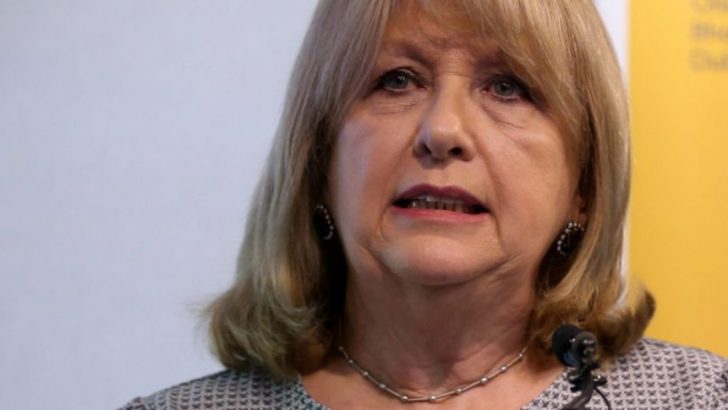The View
There has been much discussion of misogyny in the Church following Mary McAleese’s most recent assertion that the Church has become a “primary global carrier of the toxic virus of misogyny”, and “a male bastion of patronising platitudes to which Pope Francis has added his own quota”.
She had previously described the Catholic Church as one of the “last great bastions of misogyny” and has said “it’s an empire of misogyny”.
So, what is misogyny? It can be important to be clear when one makes allegations of this kind. It is defined as dislike of, contempt for, or ingrained prejudice against women. I have to say that I have not experienced dislike, contempt or prejudice over the years in the Church.
Yes, there are those people who dislike others and there is an historic sense of the superiority of the male of the species across the world. But I say again I have not experienced misogyny over the years in my membership of the Church or in the work which I have done in the Church.
Challenge
I have experienced challenge, and – on occasion – frustration when I have thought that if both lay men and women were given a greater role, the outcome might be more in keeping with the teaching of the Gospel. I think that particularly in the context of the Church’s handling of child sexual abuse. However, that has changed beyond recognition now.
The fact that ordination is not currently available to women, and that ultimate decision making is reposed in the ordained, is a very real impediment to women who wish to play a greater role in the Church. There are two issues here: ordination and decision-making.
However, the problem is the conjoining of ordination and decision-making, which affects equally both men and women. I think that the Church would benefit a great deal were it to separate the two and to create an accountable structure for decision-making involving both those who are ordained, and the lay men and women of the Church.
I have been privileged to travel the world and to see the Church at work across the globe. I have seen men and women – ordained, consecrated and lay – working very far from the centres of power challenging real misogyny, domestic violence, human trafficking and discrimination against women in societies in which women are often grossly under-represented in the corridors of power, in governments, parliaments and in the professions. So many of them are women, often religious sisters who work, and have worked, in situations of great difficulty and danger. They do the work of what I would call the operational Church.
Things are changing in what I would call the executive decision-making Church.
Women contribute to the Church across the world in probably a million ways”
A few examples from the past year or so: in April last year Pope Francis appointed three female consultants to the Congregation for the Doctrine of the Faith. Their role will be to give advice or opinions on questions which are under consideration.
After the October 2018 synod on youth, the bishops’ final recommendations called for women to hold positions of responsibility and decision-making in the Church as “a duty of justice”.
In July this year for the first time Pope Francis appointed seven women to the Congregation for Religious to play their role in reviewing major policy recommendations before they are approved by the Pope.
In May this year three nuns and one lay woman were appointed the first female consultors in the office of the Synod of Bishops, which prepares major meetings of world bishops to advise the Pope held every few years on a different topic. Not on the synod yet, but getting there, and it will give them an influence on the preparation of synods.
So, things are changing. Women do now walk the corridors of the Vatican and they are listened to, though much remains to be done.
And you know, the reality is that those who make the decisions are actually able to lead, only to the extent that we all, lay men and women, allow them to do so. We have the right and the ability to walk away, to take another path and it was always thus.
This talk of misogyny seems to me in some ways to present as a conflict in which a battle for power in the Church is being played out. I do not believe in that battle. I do not want to see a power struggle in my Church. I believe in the slow, sure work of the Holy Spirit. I am not naive, but what happens in the Church in terms of decision-making, while gravely important, is no less important for me and for many of the women (and men) I know, than the daily battle to live in the love of Christ; to be, as we are called to be, the hands, the feet, the eyes, of Christ in the world today.
Women contribute to the Church across the world in probably a million ways – they give of their time, their energy, their giftedness and their talents. They are influential and make great contributions. They do now hold positions of power, albeit not as ordained people. I know of women who act as chancellors of dioceses, (a role traditionally reserved for monsignors), of women who lead on safeguarding of children and vulnerable adults, women who teach in our schools, women who are catechists, who act as minsters of the Word and of the Eucharist – bringing Christ to the elderly, the sick and the vulnerable, women who sit on parish finance committees, women who sit on diocesan boards as trustees, women who serve on pontifical commissions, and in other posts in the Vatican. I know of women who serve, often in dangerous situations in far countries. I know of women who lead for the Catholic Church in its work on social justice here and across the world.
Women do now walk the corridors of the Vatican and they are listened to”
My decision to be part of the Church is a decision informed by the belief that Christ founded the Church, that it is his Church, that it has evolved over the years into something which is quite different from the Church in those years before and after the crucifixion and the resurrection.
Yes, our Church and those who belong to it have many human faults which we should seek to remedy, and we do need to solve the conundrum of ordination being inextricably linked to decision-making, but the reality is that much vital decision-making takes places across the world in many different circumstances, and the decisions made are not limited to the ordained.
I do not believe that the Church which I have known for so long is “an empire of misogyny”. It is the place in which I have been nourished, enabled and inspired. I have seen local, national and international recognition of the contribution of women to the Church. It is my hope that we can work positively, men and women together, in the ongoing evolution of the Church.


 Nuala O’Loan
Nuala O’Loan Mary McAleese
Photo: NewsTalk
Mary McAleese
Photo: NewsTalk 